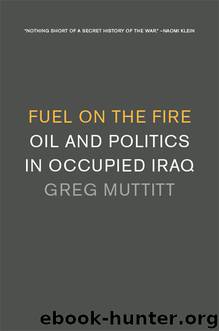Fuel on the Fire by Greg Muttitt

Author:Greg Muttitt
Language: eng
Format: epub
ISBN: 9781595588227
Publisher: The New Press
Antiwar in Washington?
The strength of the threat to Maliki was reinforced by the political dynamic on Capitol Hill in Washington, where moves made by the Democrats, whether consciously or not, served to increase pressure on the Iraqi government to pass the oil law.
On the day of her nomination as Speaker of the U.S. House of Representatives following the November 2006 midterm elections, Nancy Pelosi said that ending the Iraq War was her number one priority.19 However much the Democrats were lampooned by the Bush administration for their “cut and run” policy, that position was closer to the views of most Americans, who saw little to be achieved in Iraq and much to be lost. The Bush administration was looking thoroughly isolated in its determination to continue the war until “victory” was achieved. Even leading Republicans would defect on Iraq policy. That summer Senator Richard Lugar, a senior Republican loyalist representing Indiana, criticized the Bush administration’s handling of the war and called for a reduction in the military effort. He was followed over the next month by three more Republican senators: Pete Domenici of New Mexico, George Voinovich of Ohio, and Susan Collins of Maine.
There was a curious symmetry between the political dances of Maliki and Bush. While Maliki was trying to balance U.S. and Iraqi constituencies, Bush’s policies were shaped by simultaneously trying to achieve objectives in Iraq and bolster his political position back home. Under the U.S. Constitution, the president is responsible for foreign policy and the military, but it is Congress that authorizes the money to pay for it. The way for Congress to end the war, therefore, was to deny the president the funds to continue. The major political confrontation following the Democrats’ 2006 victory was the 2007 Supplemental Appropriations Bill, which was needed to approve continued funding of operations in Iraq and Afghanistan. In late March 2007, a month after the Iraqi cabinet had approved the draft text of the oil law, both houses of Congress approved a bill that required U.S. troops to begin to be drawn down immediately unless the administration could demonstrate progress on the benchmarks, among which they specifically named enactment of the oil law.20 In any case, all troops would have to be withdrawn by April 2008. President Bush vetoed the bill.
The second version of the bill—this time approved by Bush and enacted into law—maintained and even intensified the pressure on the benchmarks while removing any commitment to end the occupation. It formalized eighteen benchmarks, including enactment of an oil law. But instead of threatening a troop withdrawal, it mandated cutting off aid and reconstruction funds to Iraq if satisfactory progress on the benchmarks was not made. Combined with the conditional debt reductions (governed by the IMF’s Standby Arrangement) and the similar deal in the UN’s International Compact, the direct effect of this act was to provide another economic incentive for the Iraqi government: future income was now dependent on passage of the oil law. The act’s indirect effect, however, was even more powerful.
Download
This site does not store any files on its server. We only index and link to content provided by other sites. Please contact the content providers to delete copyright contents if any and email us, we'll remove relevant links or contents immediately.
| Elections & Political Process | Ideologies & Doctrines |
| International & World Politics | Political Science |
| Public Affairs & Policy | Specific Topics |
| United States |
The Secret History by Donna Tartt(19002)
The Social Justice Warrior Handbook by Lisa De Pasquale(12177)
Thirteen Reasons Why by Jay Asher(8874)
This Is How You Lose Her by Junot Diaz(6857)
Weapons of Math Destruction by Cathy O'Neil(6249)
Zero to One by Peter Thiel(5768)
Beartown by Fredrik Backman(5718)
The Myth of the Strong Leader by Archie Brown(5482)
The Fire Next Time by James Baldwin(5409)
How Democracies Die by Steven Levitsky & Daniel Ziblatt(5200)
Promise Me, Dad by Joe Biden(5132)
Stone's Rules by Roger Stone(5065)
A Higher Loyalty: Truth, Lies, and Leadership by James Comey(4937)
100 Deadly Skills by Clint Emerson(4900)
Rise and Kill First by Ronen Bergman(4761)
Secrecy World by Jake Bernstein(4727)
The David Icke Guide to the Global Conspiracy (and how to end it) by David Icke(4685)
The Farm by Tom Rob Smith(4489)
The Doomsday Machine by Daniel Ellsberg(4474)
